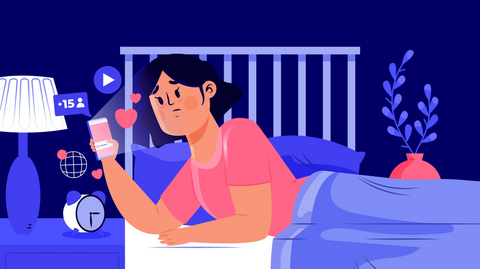This Mental Health Awareness Week, we take a look at how blue light affects our mental health and wellbeing.
As the pandemic continues across the globe and more people are working from home than ever before, blue light and mental health are both gaining much-needed coverage, but can blue light lead to the blues? Ocushield investigates. In previous research studies, mental health and mood disorder symptoms were determined as a combination of an unbalanced diet, a lack of exercise, electronic device usage and social media. However, recent studies have discovered that one factor, in particular, holds a significant impact. You guessed it...blue light.

The link between light and mood
There are both direct and indirect connections between light and mood. When one of our three types of photoreceptors (ipRGCs) directly respond to light, their projections reach certain brain regions that affect our emotions. For example, think how a sunny day makes you happy. But when indirect connections are made and symptoms are disrupted, it’s believed to contribute to mood disorders.
High levels of blue light can also increase our stress hormones, cortisol and adrenaline, which leave us feeling highly stressed, irritable, and anxious.
Sleep and mental health
Night-time exposure to blue light throws off your circadian rhythm - also known as our sleep/wake cycle or body clock. That's because blue light has been shown to disrupt melatonin production, the hormone that makes you sleepy. This can result in trouble falling and staying asleep.
All different types of light can suppress melatonin. Research from Harvard University found that blue light suppresses melatonin twice as much as green light and shifts the circadian rhythm twice as much as green light too!Your body’s circadian rhythm is essential in determining its sleeping patterns, appetite, and most importantly, your mood. A lack of sleep has been found to affect mental health, causing depression and anxiety, as well as many other health implications both mental and physical. Safe to say, blue light directly affects mental health through a lack of sleep, one of the most important things for good mental and physical health - and who doesn’t love a lay in.
Social media and mental health
One of the most important ways blue light and mental health are interlinked is through extended screen time spent on social media, creating a sense of FOMO (fear of missing out) and anxiety that you’re missing out on what your peers are doing. It’s an all-consuming feeling that brings the desire to constantly connect with what others are doing. The desire for a ‘hit’ of dopamine, coupled with a failure to gain instant gratification, may prompt users to perpetually refresh their social media feeds. But all of that time glued to screens can have some pretty negative effects on your health.
Is blue light all bad?
Not all exposure to blue light is bad, it’s what we call harmful and helpful blue. Natural blue light is what makes the sky look blue and in its natural form, blue light helps regulate our sleep and wake cycles. It's what makes us alert and active during the day. It also boosts our mood, memory, and energy levels - all of which is important for good mental health.
Bad blue comes from artificial sources, providing these sometimes beneficial results at unsuitable times - just like when you opt for one more episode on Netflix which prevents you from nodding off.
 Recent studies and scientific undertakings have only begun to delve into the cause-effect relationship between blue light and mental health. While research is uncovering more information, it’s clear that you must control your exposure to blue light to protect your mood, eyes, and body clock.
Recent studies and scientific undertakings have only begun to delve into the cause-effect relationship between blue light and mental health. While research is uncovering more information, it’s clear that you must control your exposure to blue light to protect your mood, eyes, and body clock.
How we reviewed this article:
Ocushield has strict sourcing guidelines and relies on peer-reviewed studies, academic research institutions, and medical associations.
Our experts continually monitor the health and wellness space, and we update our articles when new information becomes available.


Leave a comment